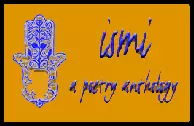Judith Benoliel Belsky
Translating
I'm always translating
searching for the best way to say hiding
we weren't marannos
it was a relief not to hidemy friends in the US
ask me if I am afraid in Jerusalem
one day as I wait for a taxi
on a quiet hillside
a truck loaded with either
gas ballonim or explosives
stops in my path
we breathe heavy
on both sides of the window
suspicions cloud the glass
I surrender first
I will die here
in the original
and her time came
LaMut
and if I perish
Avaditi
my original tongue
will be my winding sheets
nothing left unsaid between usuntil then
I negotiate idiomatic maze workas a child
even in Spanish class
I am not home
Mrs Folsom
speaks with a norteamericana twang
her Spanish a thin brittle veneer
her culture bleeds throughshe thinks me a peasant
who can compare
my folksy Ladino
and her pretentious lispy Castillian
my father brought Castillian from Gibraltar
but when he wants to woo my mother
he speaks Ladino
Aviar te kero
El anyo entero
Contar te kero
Con la me passionfor la Senora Folsom
my j's are too soft
Judica Benoliel
(La ijica de Rahel)
Even when Nona Sultana says
It is not easy
to be a Judio
behind our white moustaches
we are licking Turkish delight
and almondrades
almonds hide in their thick coats
of sugarand la noche de shabbat waits like a perfumed lover in the shadows
between los dias de la semana
like a creatura still en la madre
waiting to be bornin first grade
my cousin Sultana
is renamed Malka
she learns to hide
when she recites
this is the answer
this and only this
and it doesn't have seventy faces
of the polyglot's convergent reality
la sefardita
hides in yeshivaone time she is chastised
because she refers to her Siddur as a book
she is translating
la Torah la Torah
el livrico en el pechoher first livrico
kadoshShe is told you must call things by their proper names
To give them proper kavodShe thinks
To give them proper kavod
You hide them
You offer a subtle slice
That hints at the wholeEster Hamalka
stays in her chamber
and sends Ahashverosh
a willing version of herselfharbe shiluchim yesh la Makom
and Yitro has seven names
after he becomes a Judio
and Hamelech Shlomo
renames wisdom seven timesAnd the Shekhina has seven names
and still hides.
Watching My Grandmother
watching my grandmother knit I learn
to write poemsa persuasion of hands
insistent rhythm the click
of fine needles thought dissolving
into white thread
the release of small breath
at the end of each row a refrain
recurring dream
Come build the beloved*
the cadence of desire a surprise
a surprise
her small brown arms engrave row
after row she pulls me
in her wake
Let the beloved
Descendant of the beloved
cross currents
in search of forgotten language
sale afuera te havlarle**
si otra vez mi queres ver
by the Sea of Marmara
echo los ojos a la mar
alli me puedes encontrar
a willow tree
in her green gown
rustles rustles
sifts the wind
for strains of ancient lullaby
montanas altes y mares hondas
llevame a mi querido
scans the horizon
for the first glimpse
return of the beloved
the touch of her hand.
* come build the beloved.. from a Talmudic riddle, Menachot 53 a,b
**couplets from Judeo-Spanish lyrics of song entitled Puncha de Rosa
